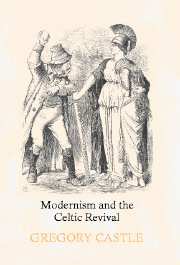Book contents
- Frontmatter
- Contents
- Acknowledgments
- List of abbreviations
- 1 The Celtic muse: anthropology, modernism, and the Celtic Revival
- 2 “Fair equivalents”: Yeats, Revivalism, and the redemption of culture
- 3 “Synge-On-Aran”: The Aran Islands and the subject of Revivalist ethnography
- 4 Staging ethnography: Synge's The Playboy of the Western World
- 5 “A renegade from the ranks”: Joyce's critique of Revivalism in the early fiction
- 6 Joyce's modernism: anthropological fictions in Ulysses
- Conclusion: After the Revival: “Not even Main Street is Safe”
- Notes
- Select bibliography
- Index
5 - “A renegade from the ranks”: Joyce's critique of Revivalism in the early fiction
Published online by Cambridge University Press: 24 November 2009
- Frontmatter
- Contents
- Acknowledgments
- List of abbreviations
- 1 The Celtic muse: anthropology, modernism, and the Celtic Revival
- 2 “Fair equivalents”: Yeats, Revivalism, and the redemption of culture
- 3 “Synge-On-Aran”: The Aran Islands and the subject of Revivalist ethnography
- 4 Staging ethnography: Synge's The Playboy of the Western World
- 5 “A renegade from the ranks”: Joyce's critique of Revivalism in the early fiction
- 6 Joyce's modernism: anthropological fictions in Ulysses
- Conclusion: After the Revival: “Not even Main Street is Safe”
- Notes
- Select bibliography
- Index
Summary
“The English Language
belongs to us. You are raking at dead fires,
rehearsing the old whinges at your age.
That subject people stuff is a cod's game,
infantile, like this peasant pilgrimage.”
Seamus HeaneyAs we have seen in the previous chapters, Yeats and Synge were instrumental in the development of an Irish modernist movement that sought to redefine the relationship between tradition and modernity. It is worth noting again Terry Eagleton's argument: “Modernism springs from the estranging impact of modernizing forces on a still deeply traditionalist order, in a politically unstable context which opens up social hope as well as spiritual anxiety. Traditional culture provides modernism with an adversary, but also lends it some of the terms in which to inflect itself.” One of the ways that traditional Irish culture lent itself to the modernism of the Celtic Revival was to provide Revivalists with the objects of a wide-ranging project of ethnographic redemption. Key elements of ethnographic practice – the reliance on a primitivist discourse, the predominance of fieldwork, and the objectivity of participant observation – emerge in the work of Revivalists like Yeats and Synge as hallmarks of an autoethnographic expressiveness capable of transforming these elements into a new mode of indigenous artistic production.
- Type
- Chapter
- Information
- Modernism and the Celtic Revival , pp. 172 - 207Publisher: Cambridge University PressPrint publication year: 2001



